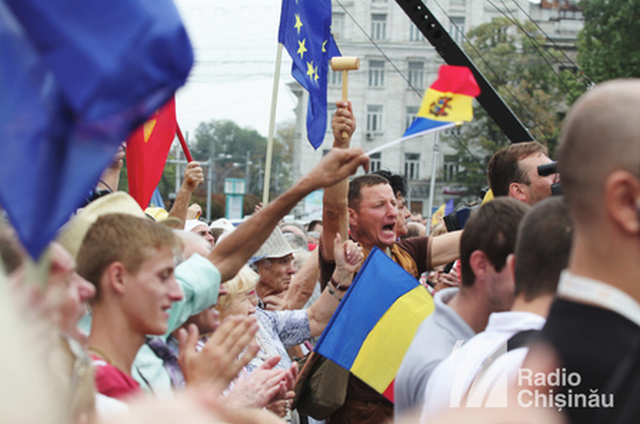Protests and claims in Chishinau
The authorities in the Republic of Moldova, a former Soviet state with a majority Romanian-speaking population, are facing an extensive and prolonged civil protest, with no one venturing to make a prediction on its denouement.

Bogdan Matei, 09.09.2015, 13:38
The centre of Chishinau has become the epicentre of a dramatic rupture between citizens and politicians. On Sunday, a huge rally organised by civic associations, attended by tens of thousands of people, vehemently accused the political class of corruption. On Monday, many tents making up a sort of small settlement emerged near the Government. The inhabitants, hundreds of them, say they will not leave the place until the cabinet resigns.
The protesters also call for the resignation of president Nicolae Timofti and the prosecutor general, for holding early parliamentary elections by March 2016 as well as for Moldovas re-embracing universal suffrage to elect the head of state, who is now being designated by MPs. The burst of indignation occurred after the political class, that pundits describe as autistic, had no reaction to the signals coming from the people in the street or from the foreign partners. In summer, the International Monetary Fund and the World Bank stopped the funding of some projects in the Republic of Moldova.
The international financial institutions announced the relation with Moldova will be frozen until the authorities start taking decisive action to solve the existing problems with the banks, from where no less than one billion dollars, the equivalent of 15% of Moldovas GDP, vanished into thin air, in unclear, suspect circumstances. ”It would be illogical and irresponsible for the World Bank to transfer its shareholders money to Moldovas budget on the front door, given the risk that even bigger sums of public money be lost on the backdoor, because of fraud and corruption in the banking sector, the World Bank Country Manager for Moldova, Alex Kremer said at the time.
The European Union has warned that it might also cut funding for the reform of the judiciary, because Moldova failed to comply with the commitments made by the authorities. They blocked the package of laws on the restructuring of the National Integrity Commission, meant to assure its independence, by excluding political control. ”I am very disappointed, said the head of the EU Delegation to Chishinau, Pirkka Tapiola. The citizens are also very disappointed. The more so as, declaring itself of pro-European orientation, the three-party ruling coalition in Chishinau, although lacking credibility, runs the risk of compromising Western values too, values that are also evoked by protesters.
On the other hand, the protest runs the risk of being hijacked, producing unforeseeable outcomes. The protesters include not only supporters of European integration or of Moldovas reunification with neighbouring Romania, but also far left militants, promoters of Moldovas rapprochement to Moscow. Actually, these promoters on Sunday evening tried to storm the Prosecutors Office, prompting the police to start a forceful intervention. Radio Romanias correspondent in Chishinau also mentions the announcement that the Socialists and pro-Russian populists, in opposition, would like to rally to the protest, which will only mount tensions and induce greater confusion.






























